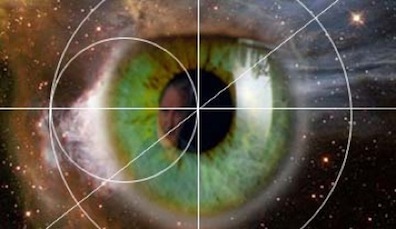At the end of Proteus, Stephen thinks of a God who
does not simply become incarnate in mankind but cycles through all of material
reality: "God becomes man becomes fish becomes
barnacle goose becomes featherbed mountain."
Throughout the novel, he rejects the conventional vision of a
beneficent God waiting outside of time to receive the good
souls who have made it through life's meat-grinder, and
instead imagines God as the
meat-grinder.
In Oxen of the Sun, God becomes literally a sound
in the street, in the form of a deafening crack of thunder
reproving Stephen for his blasphemy: "A black crack of
noise in the street here, alack, bawled back. Loud on left
Thor thundered: in anger awful the hammerhurler. Came now
the storm that hist his heart. And Master Lynch bade him
have a care to flout and witwanton as the god self was
angered for his hellprate and paganry."
In Scylla and Charybdis Stephen thinks a good deal
about this immanent God. He recalls his phrase from Nestor
as he prepares his this-worldly Aristotelian arguments against
the other-worldly Platonists: "God: noise in the
street: very peripatetic. Space: what you damn well have to
see. . . . Hold to the now, the here, through which all
future plunges to the past." This peripatetic God,
he says, "the lord of things as they are whom the most
Roman of catholics call dio boia, hangman god,
is doubtless all in all in all of us, ostler and
butcher, and would be bawd and cuckold too but that in
the economy of heaven, foretold by Hamlet, there are no more
marriages."
From this perspective Deasy is entirely wrong to say that "The
ways of the Creator are not our ways." The blog
that displays the image of an eye reproduced here voices
thoughts that may resemble Stephen's: "If God is everything,
then the divine includes rape, murder, cheating, war,
destruction and the worst of everything we can think of. Some
of the most ancient eastern religions assent to this view of
the two-faced nature of God, the yin and yang."
[2014] Thornton expresses lack of satisfaction with his
efforts to locate literary analogues for Stephen's "shout in
the street." The book of Proverbs 1:20 reads,
"Wisdom crieth without; she uttereth her voice in the streets
. . . saying, How long, ye simple ones will ye love
simplicity? and the scorners delight in their scorning, and
fools hate knowledge?" Isaiah 42:2 says, "He shall
not cry, nor lift up, nor cause his voice to be heard in the
street." And Stuart Gilbert cites Jupiter tonans,
Jupiter the Thunderer, "a phrase used several times by Ovid in
Metamorphoses" (James Joyce's Ulysses, 49).
If indeed there is an allusion to any of these passages, it is
hard to see what they might contribute to the understanding of
Stephen's thought.
[2015] In Mythic Worlds, Modern Words: Joseph Campbell
on the Art of James Joyce (New World Library, 1993),
Campbell observes that Stephen's insistence on the immanence
of God, consonant with the Hindu tat tvam asi (you
are that), implies not only a spatial indivisibility but also
a temporal one. God is in the street rather than in Heaven,
and he is also present in the present moment. Mr. Deasy argues
that history is moving toward the revelation of God, "which
puts the day of meaning in the future, as though the moment now
were but the means to another and better moment, a fulfilling
moment, to come at the end of time, a sort of apocalyptic 'Day
of God' or Marxian Revolution" (75). Stephen, however, sees no
need to wait, and he is "going to experience this very day his
own realization of the Presence through his meeting with
Leopold Bloom, who will reveal compassion and
transubstantiation" (75).

